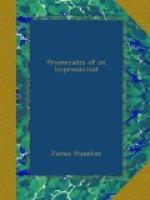FORTUNY
Mariano Fortuny: what a magic-breeding name! The motto of this lucky Spanish painter might have been “Fortuny Fortunatus.” Even his sudden death, at the early age of thirty-six, came after he had executed a number of masterpieces, an enormous quantity of water-colours, etchings, ceramics, damascene swords and chased ornaments; it followed on the heels of sudden glory. His name was in the mouth of artistic Europe, and the sale of the contents of his studio at Rome in 1875 brought eight hundred thousand francs. Yet so slippery is fame that Fortuny’s name to-day is seldom without a brace of epithets, such as “garish,” or “empty.” His work is neither. He is a virtuoso. So was Tiepolo. He is a Romantic; so the generation preceding him. The Orientalist par excellence, he has somehow been confounded with Meissonier and Gerome, has been called glittering like the former, hard as was the latter. It is true there are no emotional undertones in his temperament, the brilliant overtones predominating; but it is also true that when he died his manner was changing. He had said that he was tired of the “gay rags” of the eighteenth century, and his Strand of Portici shows a new line of departure. Edouard Manet made special appeal to Fortuny; Manet, who had derived from Goya, whose Spanish fond is undeniable. Perhaps the thrice-brilliant Fortuny’s conscience smote him when he saw a Frenchman so successfully absorbing the traditions of Goya; but it was not to be. He passed away at the very top of his renown, truly a favourite of the gods. He was admired, imitated, above all parodied; though, jealously as are his pictures guarded, he has been put on the shelf like one of the amazing painted bibelots in his work.




